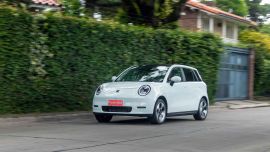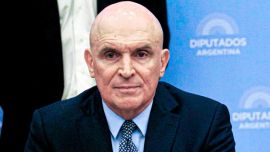A verdict is expected Tuesday in the trial of two former Ford Motor Company executives in Argentina who are accused of participating in the military dictatorship's "dirty war" against leftist dissent.
The trial, the first of its kind here, has thrown a spotlight on the conduct of multinational companies in Argentina during the military junta's brutal rule from 1976-1983.
The defendants, Hector Sibilla and Pedro Muller, have been on trial since last December, accused of complicity in the persecution of union leaders at Ford's plant in Buenos Aires.
Prosecutors have requested 25-year jail terms for them, the maximum penalty.
The court has heard testimony from dozens of people including Pedro Troiani and Carlos Propato, who were trade union leaders at Ford in Argentina when they were detained in the factory and tortured by the military dictatorship.
They were held prisoner for two years and letters were sent to their families claiming they had been fired for failing to show up for work.
Also on trial is former general Santiago Riveros, who headed a secret detention centre called Campo de Mayo where the men were held. He has previously been convicted of crimes against humanity.
SPOTLIGHT ON MULTINATIONALS
Complaints have been made against other international auto-makers, including Mercedes Benz, Renault and Fiat, but only the Ford case has so far gone to trial.
"We hope that there is a verdict of responsibility, so that it is settled that there was a complicity between business and the dictatorship, which is very important for the history of Argentina," victims' lawyer Tomas Ojea told AFP.
It's the first time that executives of a multinational company have been put on trial for crimes committed during the dictatorship.
The company itself is not implicated, but prosecutors are seeking to demonstrate there was complicity with the dictatorship responsible for the deaths and disappearances of some 30,000 people, according to human rights organizations.
"The obstacles to prosecuting businessmen complicit in human rights abuses are enormous in Argentina and the world in general. Hence the importance of this process, and fortunately we have reached the end this year," said Ojea.
"There are certain legal obstacles to taking civil suits, which have to do with the statute of limitations, so if we had brought a case against Ford itself as a company, our assessment was that the trial would not have advanced as it has," said Ojea.
TORTURE CENTRE
When the military took over in a 1976 coup d'etat, some 5,000 workers were employed at the plant, as well as 2,500 administrative staff.
Twenty-four of the 100 trade union delegates at the plant were taken captive in retaliation for union activism, according to prosecutors.
Several were tortured at the plant, on the northern periphery of Buenos Aires, before they were transferred to secret detentions centers.
"Without the participation of civilians and more of these companies, this coup would not have succeeded," Troiani told AFP in September.
"These people collaborated, they gave them vehicles, food, fuel, they gave them the companies so they could move as they wanted, and that's how we were removed, one by one," he added.
According to historian Victoria Basualdo, the simmering union activism of the 1970s was "a central worry as much for the armed forces as it was for company management."
In the decades after the return to democracy, Argentina has taken enormous strides towards prosecuting those accused of human rights violations during the dictatorship.
Hundreds of military personnel of various ranks have been sentenced while several members of the successive military juntas died in prison.
by by Nina Negron/AFP
























Comments